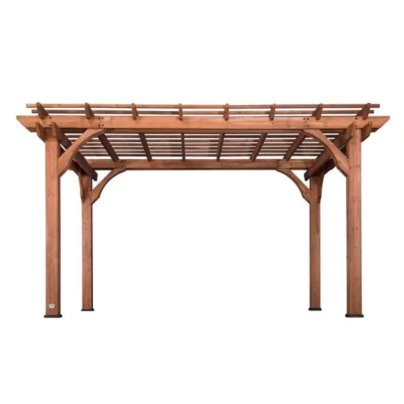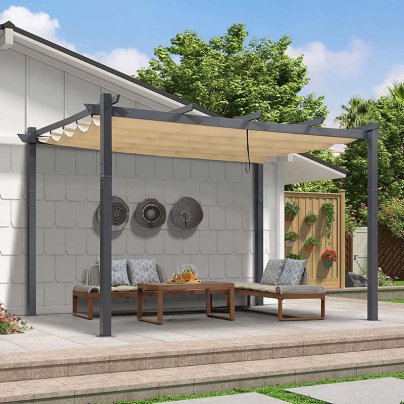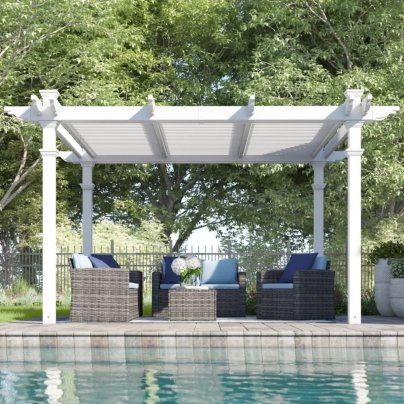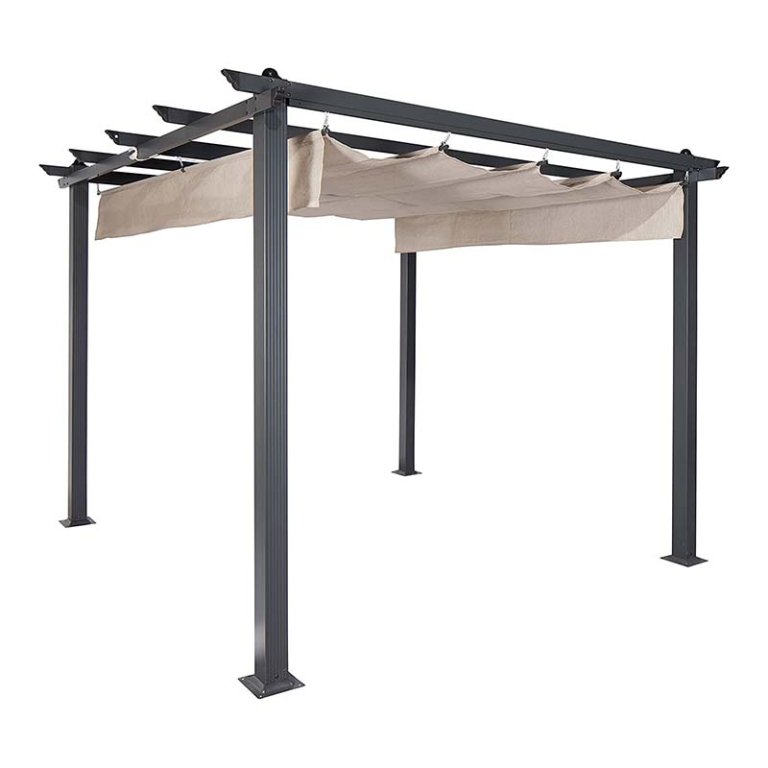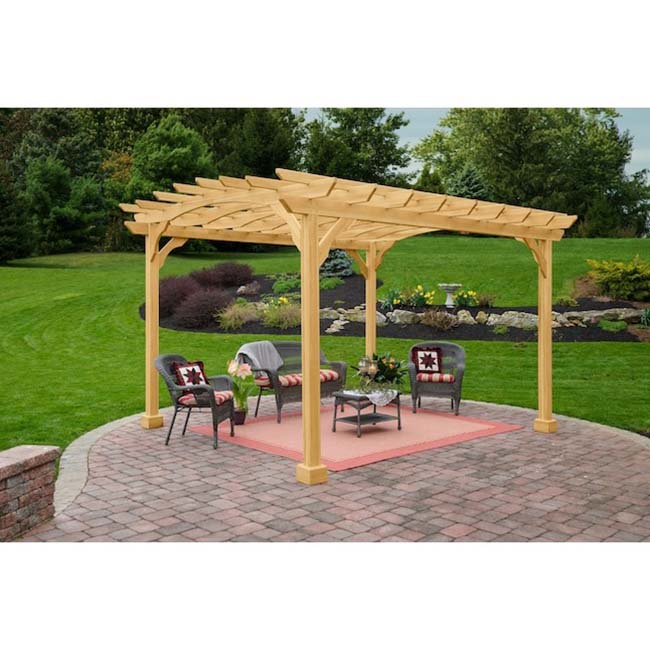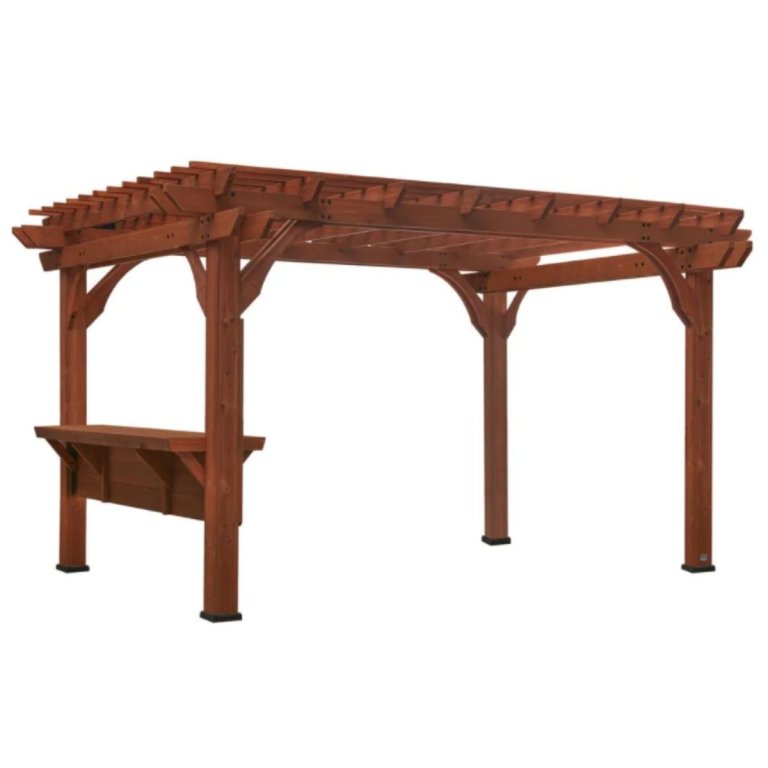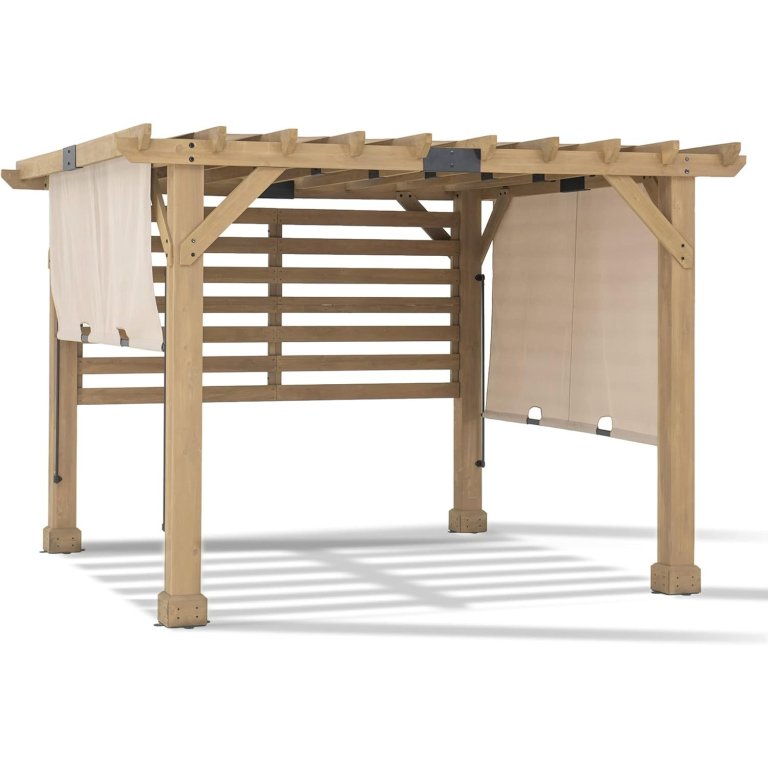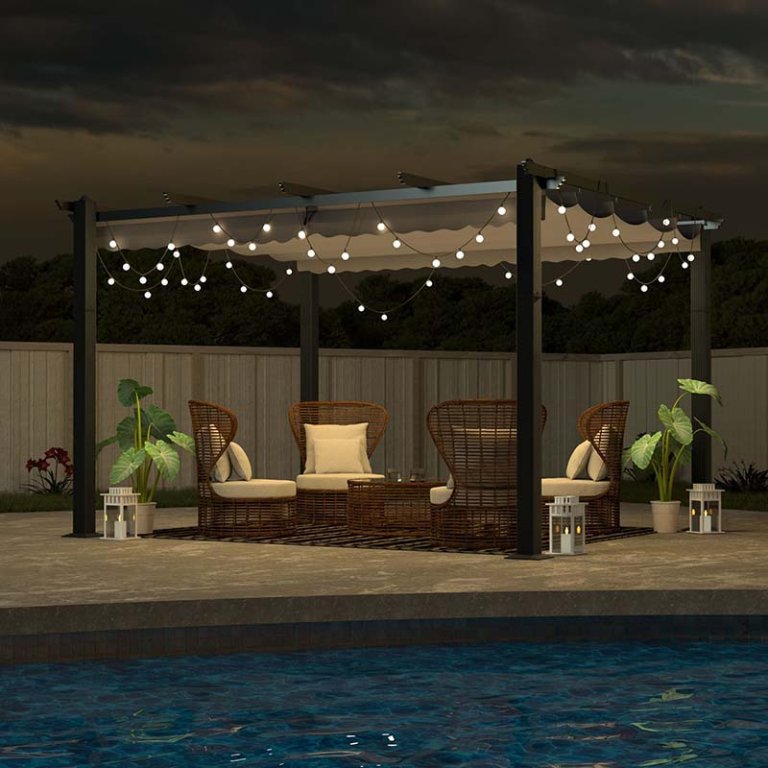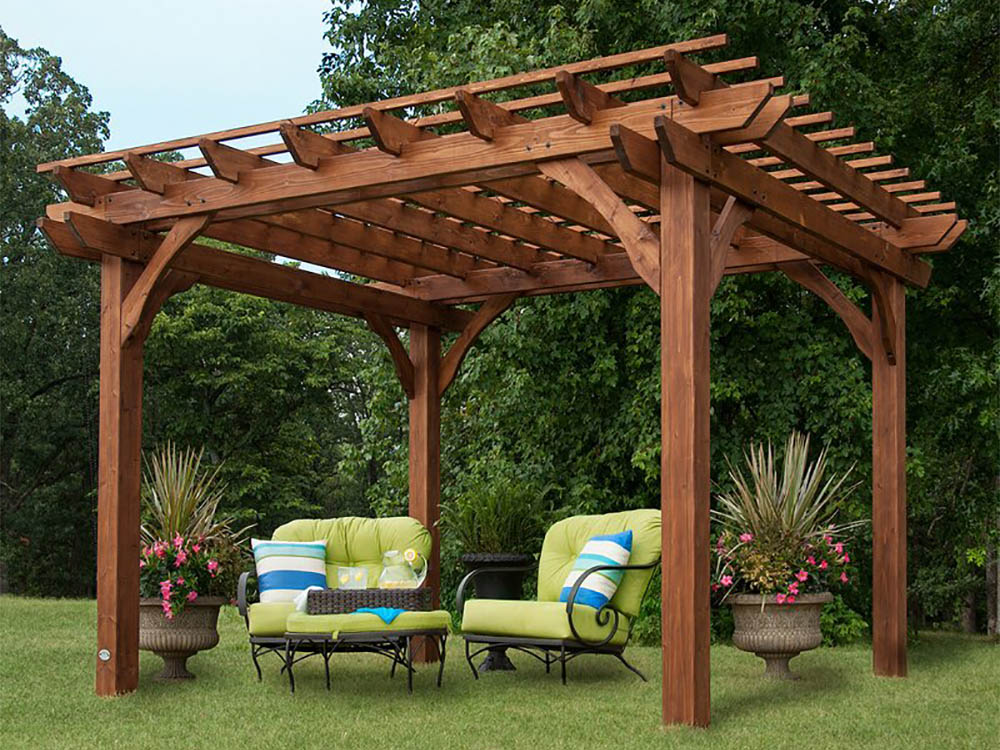
We may earn revenue from the products available on this page and participate in affiliate programs. Learn More ›
Pergola kits offer a convenient way to enhance an outdoor living space. Aside from a few basic tools and some help from a friend, they come with everything you need to build an attractive and functional structure, including posts, beams, rafters, purlins (aka slats), and hardware. However, their designs and the DIY skills required to assemble them range from simple to complex, so it’s a smart idea to do a bit of research before buying one.
After reviewing dozens of kits and talking to a landscaping design expert who installs these structures, we selected the Backyard Discovery 14 x 10 Beaumont Pergola as our favorite outdoor pergola kit. It’s made from attractive weather-, insect-, and rot-resistant cedar; includes resin feet and concrete anchors for withstanding winds of up to 100 miles per hour; and follows an interactive 3D assembly guide through the BILT app. If you’re looking for an outdoor pergola that’s smaller, larger, or made of another material, our list of the best pergola kits includes nine other excellent choices.
- BEST OVERALL: Backyard Discovery 14 x 10 Beaumont Pergola
↓ Jump to Review - BEST BANG FOR THE BUCK: Purple Leaf 12 x 16 Pergola With Retractable Canopy
↓ Jump to Review - UPGRADE PICK: Arlmont & Co. 12 x 12 Corfu Vinyl Pergola
↓ Jump to Review - BEST MIDRANGE: Coolaroo 9’10” x 9’10” Aurora Pergola
↓ Jump to Review - BEST WITH CANOPY: Sunjoy 9.5 x 11 Metal Arched Pergola With Canopy
↓ Jump to Review - BEST WITH CURVED ROOF: YardCraft 10 x 12 Wood Pergola Kit
↓ Jump to Review - BEST FOR ENTERTAINING: Backyard Discovery 14 X 10 Ashland Pergola
↓ Jump to Review - BEST FOR PRIVACY: Sunjoy 10 x 11 Wooden Pergola With Adjustable Canopy
↓ Jump to Review - BEST METAL: Veikous 10 X 10 Aluminum Pergola With Canopy
↓ Jump to Review - BEST WOOD: Backyard Discovery 16 x 12 Beaumont Wood Pergola
↓ Jump to Review
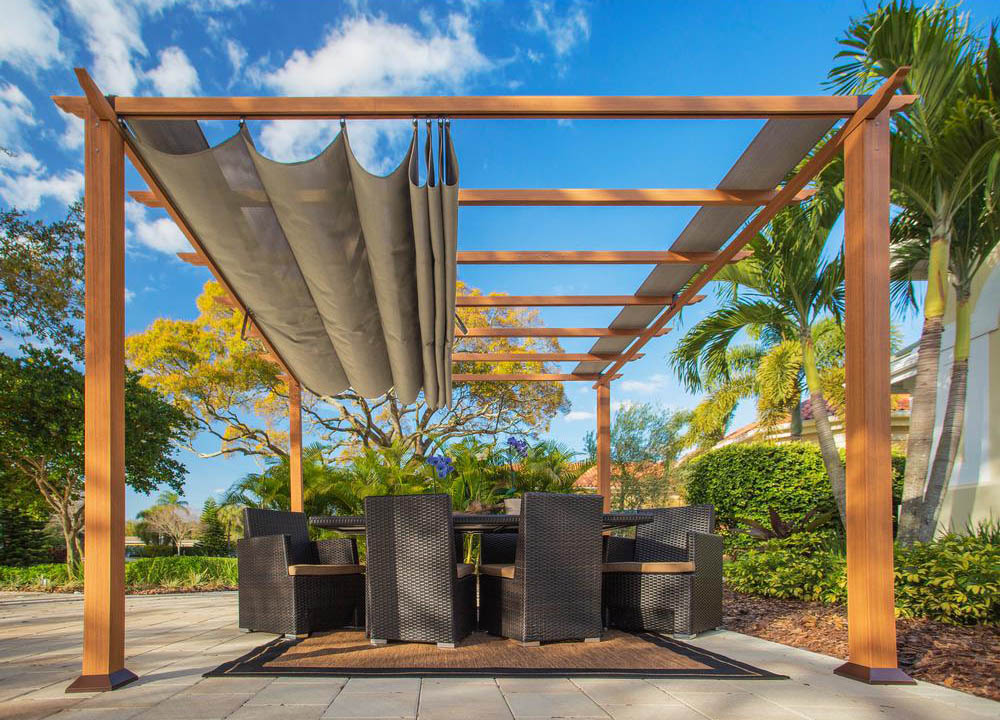
Before You Buy a Pergola Kit
Understanding the difference between a pergola, a gazebo, an arbor, and a trellis will help you choose the best structure for your needs.
- A pergola offers a semi-shaded outdoor living space. It includes posts that support an open structure of beams, rafters, and purlins, allowing sunlight to shine through its openings.
- A gazebo is a freestanding round, octagonal, or hexagonal garden structure with a finished floor, interior bench seating, low walls, and a complete roof. The roof is traditionally pitched to the center, creating a conical shape.
- An arbor is similar to a pergola, except it is much smaller and defines an entry or divides a pathway. Most arbors are intended to be walked through, but some have small integrated benches.
- A trellis is a vertical framework of closely spaced intersecting lattices that form a sturdy structure with small openings. It can be its own structure or attached to a standing pergola or house to support climbing plants.
Pergolas aren’t suitable for every outdoor space, especially small yards, as they tend to be large enough to accommodate seating or even a table. Before buying a pergola, check local laws and neighborhood restrictions to ensure installation is allowed, if you need a permit to build one, and whether there are any size limitations regarding the structure you can select.
Pergola Kits Comparison Chart
| Product Name | Material | Overall Dimensions | Interior Dimensions | Ease of Assembly |
| Backyard Discovery 14 x 10 Beaumont Pergola | Cedar wood | 7.92 feet high by 14 feet long by 10 feet deep | 7.06 feet high by 11.04 feet long by 7.04 feet deep; 77.72 square feet | Easy |
| Purple Leaf 12 x 16 Pergola With Retractable Canopy | Aluminum | 8 feet high by 14.8 feet long by 10.5 feet deep | 8 feet high by 14.25 feet long by 10 feet deep; 142.5 square feet | Easy |
| Arlmont & Co. 12 x 12 Corfu Vinyl Pergola | Vinyl and PVC | 8.65 feet high by 12 feet long by 12 feet deep | 7.5 feet high by 11.16 feet long by 11.16 feet deep; 124.55 square feet | Easy |
| Coolaroo 9’10” x 9’10” Aurora Pergola | Powder-coated aluminum | 9.42 feet high by 9.83 feet long by 9.83 feet deep | Not listed; approximately 96.6 square feet | Difficult |
| Sunjoy 9.5 x 11 Metal Arched Pergola With Canopy | Powder-coated steel | 7.8 feet high by 10.8 feet long by 8.9 feet deep | 7.6 feet high by 9.5 feet long by 7.5 feet deep; 71.25 square feet | Moderate |
| YardCraft 10 x 12 Wood Pergola Kit | Southern yellow pine wood | 8.5 feet high by 13.67 feet long by 11.67 feet deep | 7.82 feet high by 8.98 feet long by 10.98 feet deep; 98.60 square feet | Easy |
| Backyard Discovery 14 x 10 Ashland Pergola | Cedar wood | 7.92 feet high by 14 feet long by 10 feet deep | 7.06 feet high by 10.96 feet long by 7.96 feet deep; 87.26 square feet | Moderate |
| Sunjoy 10 x 11 Wooden Pergola With Adjustable Canopy | Cedar wood | 8 feet high by 11 feet long by 10 feet deep | 7 feet high by 8 feet long by 8 feet deep; 64 square feet | Easy |
| Veikous 10 x 10 Aluminum Pergola With Canopy | Aluminum | 7.29 feet high by 10.46 feet long by 9.68 feet deep | 6.88 feet high by 8.83 feet long by 7.94 feet deep; 70.11 square feet | Easy |
| Backyard Discovery 16 x 12 Beaumont Wood Pergola | Cedar wood | 7.92 feet high by 16 feet long by 12 feet deep | 7.08 feet high by 13 feet long by 10 feet deep; 130 square feet | Moderate |
Our Top Picks
The best pergola kits turn available lawn, patio, or deck space into an outdoor oasis. With one of the following top picks, you can build a place for kids to play, friends to visit, and your family to share a meal.
Best Overall
Backyard Discovery 14 x 10 Beaumont Pergola
What We Like
- Provides ample space for furniture and friends
- Resin feet and concrete anchors
- 3 USB and 3 120-volt outlets
- Simple step-by-step assembly instructions
What We Don’t Like
- Only available in one color
Specs
- Material Cedar wood
- Overall dimensions 7.92 feet high by 14 feet long by 10 feet deep
- Interior dimensions 7.06 feet high by 11.04 feet long by 7.04 feet deep; 77.72 square feet
- Ease of assembly Easy
The Backyard Discovery cedar pergola adds elegance and functionality to any outdoor space, creating over 77 square feet for lounging and entertaining. Built for durability, it features resin feet and concrete post anchors that keep it stable and secure, even when wind and rain blow in. Its slats leave room for vines and plants, allowing those with a green thumb to enhance the pergola’s aesthetic and cultivate additional shade.
Assembly and installation are straightforward thanks to the manufacturer’s interactive BILT app, which guides users through setup with 3D step-by-step instructions. Pieces come prestained and precut, and you get all the steel hardware you need. The finished product has a power port with three USB and three 120-volt outlets for all your electronic needs.
Get the Backyard Discovery cedar pergola at Amazon, Lowe’s, The Home Depot, Wayfair, Walmart, or Backyard Discovery.
Best Bang For The Buck
Purple Leaf 12 x 16 Pergola With Retractable Canopy
What We Like
- Made of rust-resistant and powder-coated aluminum
- Retractable and lockable canopy
- UV-resistant and water-repellent construction
- Canopy is available in multiple colorways
What We Don’t Like
- May require concrete surface for more stable affixing
Specs
- Material Aluminum
- Overall dimensions 8 feet high by 14.8 feet long by 10.5 feet deep
- Interior dimensions 8 feet high by 14.25 feet long by 10 feet deep; 142.5 square feet
- Ease of assembly Easy
This pergola kit from Purple Leaf boasts a retractable canopy that allows you to enjoy an afternoon in either sun or shade. The UV-resistant and water-repellent canvas protects from the weather when closed, locks to ensure it stays safely in place, and is available in neutral grey or beige as well as bold turquoise and terra cotta.
The frame on this budget-friendly pick is constructed with rust-resistant, powder-coated aluminum for durability and a sleek, modern look. While it’s built to be sturdy, securing the base plates to concrete or another surface can enhance its structural integrity. At 8 feet high by 14.8 feet long by 10.5 feet deep, it provides a massive 142.5 square feet for seating, dining, and entertaining—making it a perfect poolside retreat, hot tub area, or outdoor gathering space.
Get the Purple Leaf pergola at Amazon, Wayfair, Walmart or Purple Leaf.
Upgrade Pick
Arlmont & Co. 12 x 12 Corfu Vinyl Pergola
What We Like
- Strong, all-season vinyl construction
- Comes with 3 adjustable panels
- Durable materials are weather-, mold-, rust-, and corrosion-resistant
- Attaches to a variety of surfaces
What We Don’t Like
- Anchor and mounting materials not included
Specs
- Material Vinyl and PVC
- Overall dimensions 8.65 feet high by 12 feet long by 12 feet deep
- Interior dimensions 7.5 feet high by 11.16 feet long by 11.16 feet deep; 124.55 square feet
- Ease of assembly Easy
Arlmont & Co.’s vinyl pergola kit offers plenty of outdoor living space for entertaining or relaxing in the sun. Its interior area measures 7.5 feet high by 11.16 feet long by 11.16 feet deep, providing 124.55 square feet you can use to your liking. With three independently adjustable louver panels, it’s easy to customize coverage to accommodate the sun’s position and how much light you want to let in.
This UV-, water-, and rust-resistant vinyl structure is built for year-round use and can be anchored to grass, concrete, or wood. Unlike wood, vinyl won’t rot, crack, peel, fade, or rust—making this option an excellent low-maintenance choice. Plus, its straightforward assembly instructions make setup a breeze.
Get the Arlmont & Co. pergola at Wayfair.
Best Midrange
Coolaroo 9'10" x 9'10" Aurora Pergola
What We Don’t Like
- Made from rust-, UV-, mildew-, and water-resistant aluminum
- Canopy comes in 3 stylish colors
- Creates a contemporary look at a reasonable price
What We Don’t Like
- Increased height and poor instructions make for difficult assembly
Specs
- Material Powder-coated aluminum
- Overall dimensions 9.42 feet high by 9.83 feet long by 9.83 feet deep
- Interior dimensions Not listed; approximately 96.6 square feet
- Ease of assembly Difficult
Coolaroo’s Aurora pergola is a stylish and reasonably priced way to elevate your outdoor space without overwhelming your yard. It has an attractive aluminum frame and a removable weatherproof polyethylene canopy that comes in three stylish colors, making it a versatile choice for everything from formal gatherings to casual lounging. If your event calls for full sun or a view of evening stars, simply remove the canopy to create a true indoor/outdoor feel.
With a 9.83-foot square footprint, this modern pergola kit provides enough space for comfortable outdoor dining, while its 9.42-foot height offers enough headroom to stand comfortably. Though it comes with precut pieces, predrilled holes, and deck fasteners for stability, the instructions can be difficult to follow, so this may not be the best choice for DIYers with limited experience.
Get the Coolaroo pergola at Amazon or Wayfair.
Best With Canopy
Sunjoy Arched Pergola With Canopy
What We Like
- Sturdy powder-coated steel frame
- Compact design is ideal for smaller spaces
- Includes weather-resistant adjustable canopy
- Comes with anchor/mounting hardware
What We Don’t Like
- Assembly is easier with 3 people
Specs
- Material Powder-coated steel
- Overall dimensions 7.8 feet high by 10.8 feet long by 8.9 feet deep
- Interior dimensions 7.6 feet high by 9.5 feet long by 7.5 feet deep; 71.25 square feet
- Ease of assembly Moderate
At some point in the day, the sun always seems to find you in that spot with no shade. But with this metal pergola kit from Sunjoy, you can finally say goodbye to that problem. With the adjustable 7.8-foot-high canopy, it’s easy to block either side of this structure to provide relief exactly where you need it.
Designed with style in mind, Sunjoy’s covered pergola kit features a tan-colored canopy with chocolate brown trim that perfectly complements the brown steel frame. Thanks to its rust-resistant powder coating, this pergola is sturdy and built to last. While we think its instructions are relatively easy to follow, the process is definitely quicker with a couple of extra sets of hands. If you want to get the project done in a day so it’s ready for an upcoming outdoor event, we recommend you ply two people with free food and drink so it’s set up in time.
Get the Sunjoy pergola at Lowe’s, Tractor Supply Co., The Home Depot, Wayfair, Walmart, Overstock, or Sunjoy.
Best With Curved Roof
YardCraft 10 x 12 Wood Pergola Kit
What We Like
- Constructed of sturdy pine
- Suitable for installation on multiple surfaces
- Available stained or unstained
- All hardware included
What We Don’t Like
- Requires staining or sealing every 1 to 2 years
- Solid wood increases price
Specs
- Material Southern yellow pine wood
- Overall dimensions: 8.5 feet high by 13.67 feet long by 11.67 feet deep
- Interior dimensions 7.82 feet high by 8.98 feet long by 10.98 feet deep; 98.60 square feet
- Ease of assembly Easy
With its elegant curved roof, YardCraft’s premium wood pergola kit brings both style and sophistication to any outdoor space. Its water-resistant, solid-wood construction ensures it’s suitable for year-round use. Since it’s available in both stained and unstained versions, it’s easy to customize to complement existing backyard fixtures. Whether you’re curling up with a great book, watching the stars at night, or hosting guests at a dinner party, this pergola creates the perfect backdrop.
A couple of other things we really like about this kit’s design are how the trim around the base of the posts hides the anchor brackets and how each intersection of the roof is notched to lock together and prevent warping. This versatile pergola can be anchored into concrete, placed on a patio, or positioned next to a pool. While it’s great that it’s ideal for such a wide range of outdoor uses, it’s even better that it’s relatively easy to assemble.
Get the YardCraft pergola kit at The Home Depot, Wayfair, or YardCraft.
Best For Entertaining
Backyard Discovery 14 x10 Ashland Pergola
What We Like
- Naturally water-, insect-, and corrosion-resistant
- Features built-in 7-foot bar and power port
- Durable resin feet and concrete anchors
- Suitable for large backyards or entertainment spaces
What We Don’t Like
- Additional features increase assembly difficulty
Specs
- Material Cedar wood
- Overall dimensions 7.92 feet high by 14 feet long by 10 feet deep
- Interior dimensions 7.06 feet high by 10.96 feet long by 7.96 feet deep; 87.26 square feet
- Ease of assembly Moderate
Create an outdoor space worthy of entertaining friends and family with Backyard Discovery’s spacious cedar pergola. Offering over 140 square feet of filtered shade and 87.26 square feet of usable space underneath, it provides plenty of room for both guests and furniture. It even has a built-in 7-foot bar for serving drinks and food during gatherings.
We really like that this option has a set of electrical outlets in one post, allowing you to plug in a stylish set of string lights, charge multiple mobile devices, or power anything else that will enhance the party. While the bar and power port make assembly a bit more challenging than that of basic wooden pergolas, all cedar pieces come precut, predrilled, and prestained, which does help quite a bit. Built to last, this kit also features durable resin feet and concrete anchors to help keep it securely in place.
Get the Backyard Discovery Ashland pergola at Amazon, Lowe’s, The Home Depot, Wayfair, Walmart, or Backyard Discovery.
Best For Privacy
Sunjoy 10 x 11 Wooden Pergola With Adjustable Canopy
What We Like
- Attractive wooden frame and privacy wall
- Adjustable canopy for customizable shade
- Large enough for seating and dining without being overwhelming
What We Don’t Like
- Cedar requires regular maintenance
Specs
- Material Cedar wood
- Overall dimensions 8 feet high by 11 feet long by 10 feet deep
- Interior dimensions 7 feet high by 8 feet long by 8 feet deep; 64 square feet
- Ease of assembly Easy
This Sunjoy 10-foot by 11-foot wooden pergola kit offers the perfect blend of natural aesthetics, sun control, and personal space. Its wooden construction provides a classic, inviting look that complements most outdoor areas, and it comes with an adjustable canopy and privacy wall to protect against the elements and unwanted eyes.
Like other canopied picks on our list, we appreciate that you can choose how much shade you want based on the time of day or weather conditions, but we also love that this kit allows you to create a cozy space that’s more or less protected on three sides. Still, all that wood requires regular upkeep, and the initial assembly of the extra feature increases how long the process takes. But once this kit is constructed, we think what it adds in terms of enhanced comfort and usability of your outdoor area will make it worth it.
Get the Sunjoy wooden pergola at Amazon, Tractor Supply Co., The Home Depot, Walmart, or Sunjoy.
Best Metal
Veikous Aluminum Pergola With Canopy
What We Like
- Adjustable canopy moves smoothly and easily
- Lightweight aluminum materials
- Canopy features reinforced coating
What We Don’t Like
- Assembly instructions are confusing
Specs
- Material Aluminum
- Overall dimensions 7.29 feet high by 10.46 feet long by 9.68 feet deep
- Interior dimensions 6.88 feet high by 8.83 feet long by 7.94 feet deep; 70.11 square feet
- Ease of assembly Easy
The Veikous aluminum pergola combines style, durability, and functionality. Crafted from high-quality aluminum, it’s built to withstand the elements and deliver long-lasting performance. Its retractable canopy provides control over the outdoor space, accommodating your desire for shade or sunlight with a simple adjustment. Its waterproof canopy keeps you covered during unexpected rain showers and features a fade-resistant UV coating to aid it in retaining its vibrant appearance for years to come.
Designed for both residential and commercial settings, this pergola creates a versatile outdoor oasis. Perfect for enhancing a patio, garden, or backyard, it offers space for relaxation, entertaining, or even hosting events. With its sleek and modern design, the Veikous pergola can become the centerpiece of any outdoor area, offering both style and functionality in one package.
Get the Veikous pergola kit at Amazon, Lowe’s, Wayfair, Walmart, or Veikous.
Best Wood
Backyard Discovery 16 x 12 Beaumont Wood Pergola
What We Like
- Cedar construction withstands 100-mile-per-hour winds
- Comes with a 3D interactive guide through the BILT app
- Available in multiple sizes
- All mounting and assembly hardware included
What We Don’t Like
- Only comes in 1 finish
Specs
- Material Cedar wood
- Overall dimensions 7.92 feet high by 16 feet long by 12 feet deep
- Interior dimensions 7.08 feet high by 13 feet long by 10 feet deep; 130 square feet
- Ease of assembly Moderate
Wood pergolas add an attractive and warm touch to an outdoor space, and this option from Backyard Discovery outshines all the rest. This 100 percent cedar pergola kit comes with thick posts with diagonal braces that can withstand all-season weather conditions and stand firm in 100-mile-per-hour winds. Cedar is also naturally good at resisting corrosion and insects, which is a welcome bonus.
With exterior dimensions of 7.92 feet high by 16 feet long by 12 feet deep, this pergola is best for larger spaces. It has 6-inch-long by 6-inch-wide posts, a trellis and frame, a power port, powder-coated anchoring plates, and galvanized steel hardware. Though we think the finished product is stunning, assembly will be much easier with an extra set (or two) of hands. Still, the process is as simple as can be with the help of the step-by-step instructions provided by the manufacturer’s interactive 3D BILT app.
Get the Backyard Discovery Beaumont pergola kit at Amazon, Lowe’s, The Home Depot, Wayfair, Walmart, or Backyard Discovery.
Jump to Our Top Picks
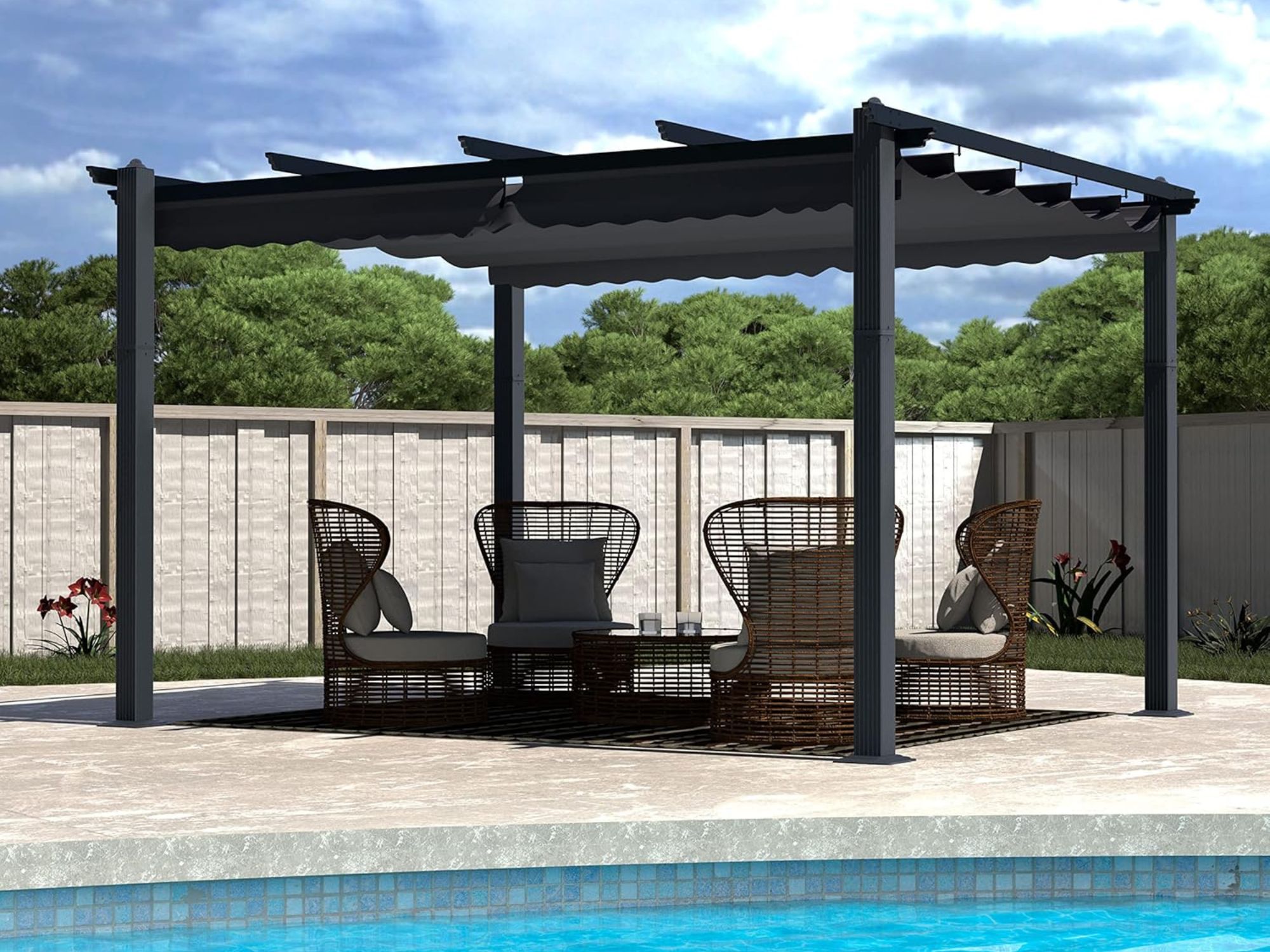
How We Chose the Best Pergola Kits
A backyard pergola kit is an effective way to add style and functionality to an outdoor space. When choosing the ten kits to recommend for our list of top picks, we considered build quality, size, ease of assembly (including whether necessary pergola bracket kits and hardware came with purchase), and additional special features.
To accommodate various needs and climates, we chose prefabricated pergola kits made from aluminum, vinyl, metal, and wood to ensure lasting use and weather resistance. We included varying sizes, ensuring we selected small pergola kits suitable for small yards and more substantial options for large yards. We also considered ease of assembly and whether they came with special features like adjustable panels or canopies for rain and UV protection, bars for entertaining, outlets, or resin feet for added durability.
What to Consider When Choosing a Pergola Kit
When choosing the best pergola kit, it’s essential to consider material, size, desired aesthetics, and intended use. You’ll also want to factor in ease of installation and whether certain additional features will help you enjoy it even more.
Ward Dilmore, founder and head landscape designer at Petrus Landscaping, points out that factoring in climate is also vital. “If you live in an environment with harsh winters and intense storms, durability and material longevity are essential considerations. Weather-resistant woods like cedar or pressure-treated lumber can withstand harsher weather environments,” he says.
Material
Pergolas are made of wood, aluminum, steel, fiberglass, cellular PVC, and vinyl—each with distinct advantages and disadvantages.
- Wood pergola kits have a rustic, natural aesthetic and can be stained or painted to suit your style. However, they do require some ongoing maintenance to protect their color and structural integrity, and they can cost more since they are made of food. Wooden pergola kits are also heavier than other types, so they aren’t especially easy to move after assembly.
- Aluminum pergola kits are sleek, modern, and lightweight. An aluminum pergola kit has a nonporous surface that resists rot and rust, though it will still be less durable than either a steel or fiberglass pergola and may get dented over time. This type of pergola kit requires minimal maintenance and is also one of the most affordable options.
- Steel pergola kits typically have dark metal finishes and a stylish, minimalist appearance. They are durable, built to withstand the elements, and strong enough to cover a wider area with fewer supports. Though metal pergola kits require some annual maintenance, they are available at midrange price points.
- Fiberglass pergola kits are strong and have a long lifespan, but they may crack in extreme temperatures. Although slightly heavier than aluminum, they are generally lightweight with hollow components that make it easy to install lighting, fans, and patio heaters. Though they require minimal maintenance, they are one of the most expensive options on the market.
- Cellular PVC pergola kits are made with wood-like polymer/synthetic PVC plastic that’s resistant to splitting and rotting. They are nearly impermeable to moisture, easy to paint, and require low to no maintenance. However, they are more expensive than natural wood.
- Vinyl pergolas are available in neutral shades that blend well with backyard spaces and are resistant to fading, chips, and cracks. Vinyl pergolas are also virtually maintenance-free and typically on the higher end of the spectrum in terms of pergola cost.
Purpose and Type
A pergola kit provides patio shade, privacy, and an overall upgrade to an underutilized lawn or patio space. Some attached pergolas may even increase a home’s value, making them a smart long-term investment.
Pergolas create a homey outdoor space for social events, quiet solo time, or family dinnertime. While the uses of a pergola are only limited to your imagination, certain types of pergolas may align better with each user’s particular needs, including open top, sail, gabled (all freestanding structures), and attached.
- Open-top pergolas have an open roof, leaving the interior exposed to the elements. Designed for climbing plants to wind around, these pergolas provide additional shade and weather protection as the vines grow thicker over time.
- Sail pergolas provide shade through fabric stretched taut between several poles of varying heights. This style offers more UV protection than an open top or a shade sail, but it may catch strong winds that cause wear and tear over time.
- Gabled pergolas have a pitched roof with triangular gables at the ends. This shape offers more interior height and space than flat-roof designs.
- Attached pergolas use a structure, usually the side of a house, to support one or more sides instead of additional columns. They create a smooth transition from indoor to outdoor space but may require a permit to install.
Size and Shape
The right size of a pergola for a yard, patio, or deck depends on the size of the yard, as most users want ample interior space without making their yard feel crowded. Typical pergola kit sizes range from as small as 7 feet by 7 feet to as large as 20 feet by 20 feet.
Pergolas can be quite tall, so make sure that there is enough clearance to avoid touching tree branches, awnings, and other obstacles. Post placement is also crucial so the structure has the support it needs to keep from collapsing. Pergola shapes vary, and the choice depends on both personal style and the best fit for the yard.
- Square pergolas include two to four posts and are easy to place in a yard, on a deck, or on a patio.
- Rectangular pergolas create enough space for an outdoor dining table and additional room for entertaining.
- Hexagonal pergolas may be harder to find. They’re generally for larger deck spaces or poolside areas. They take up much more room and may have additional posts, which makes placing them more difficult.
- Circular pergolas tend to be larger and may require more posts to support their circular shape. These more intricate showpieces are intended for larger spaces and feature material for arches and other curved shapes. They are often suitable for big yards, gardens, or barbecue areas.
Aesthetic
Pergolas tend to fit into a traditional, modern, or contemporary aesthetic, and there are beautiful ways to use a backyard pergola to fit any style.
- Traditional pergolas are more decorative and are usually made from wood treated with a protective sealant. This aesthetic employs elements such as scrolled ends on the beams or rafters, even spacing of purlins on the roof, and decorative posts.
- Modern pergolas utilize a simple box frame with clean lines. Made of various materials, such as metal, fiberglass, and PVC, they are streamlined with blunt ends and minimalist details.
- Contemporary pergolas incorporate a variety of design elements such as arched tops, curves, and I beams. They may mix parts of traditional and modern aesthetics, using several materials to create a new and noteworthy style.
Adding vines, trellises, or curtains can enhance the aesthetic of a pergola.
- Vines can climb a trellis or the flat top of a pergola to create a living wall or structure.
- Trellises on the sides of a pergola provide additional privacy, shade, and a place for vines to climb.
- Curtains can be installed in a pergola’s frame for privacy, to increase shade, and to create a cabana-style aesthetic.
Additional Features
Specialized pergolas may offer extra features like bench seating, built-in tables, and motorized screens.
- Bench seating may be built into the side of a pergola, much like a gazebo. A bench provides a place to enjoy the outdoors without needing to invest in additional armchairs and accent chairs. These seats are typically made of the same material as the rest of the pergola.
- Built-in tables solve the issue of where to set up a bar, place appetizers, or play cards. As these tables are generally taller than a standard dining table, users can stand at or sit on stools around the table.
- Motorized screens come in handy when the sun dips low. The flat top of the pergola only provides shade when the sun is higher in the sky. With a click of a button, a motorized pergola screen lowers to just the right height to keep the sun out of your eyes as it sets.
Installation
Pergola kits typically include all the necessary precut and predrilled materials, including anchors. In most instances, users will need just the pergola plans, building materials, and a few tools, such as a wrench and a drill or screwdriver. Depending on whether the pergola is freestanding or attached, there are two installation methods.
- Freestanding pergolas are independent of other structures, offering flexibility in their placement. They must be properly anchored to a patio, deck, concrete, or lawn to prevent them from falling over. These pergola kits often offer easy-to-follow instructions, making them ideal for DIY installation.
- Attached pergolas are a bit more complex as they need to be secured to a home or building via a ledger board and may not be considered a “DIY pergola kit” unless the DIYer is confident in carpentry skills. Based on the unique features and dimensions of the home or building, attachment methods may vary. Consulting with a contractor may be the best option for this installation.
FAQs
Once you’ve decided to purchase a pergola kit, you may have additional questions about its purpose or how to best use it. Read on for some of the most frequently asked questions and answers about pergolas.
The main difference between a pergola and a gazebo is the roof. Most gazebos have a covered roof that provides full coverage from UV rays, while a pergola kit with a roof will usually have a retractable awning, a slatted roof, or a trellis that provides only partial shade. Both of these outdoor structures provide a comfortable, covered space for expensive or cheap patio furniture, outdoor kitchens, and gardens.
A pergola extends living space to the outdoors, essentially creating an open-air room that protects users from overbearing sunlight and the elements while providing a place to entertain and relax.
Building a DIY pergola from a kit is much cheaper than buying one preassembled. The pergola kits on our list cost $600 and $2,000, while prefabricated pergola designs can range from $1,000 to $7,000. Custom pergola kits can run even higher at $10,000 to $15,000.
Yes, you can install a cover to provide more shade when spending time inside the pergola. Several options on our list feature retractable, weatherproof fabric canopies that are easy to use and maintain. For comfort that extends from overhead to underfoot, consider also adding an outdoor rug.
Heavy-duty or large pergolas must be anchored to a leveled or unlevel concrete surface to ensure they remain in place and withstand inclement weather. Lightweight models made with aluminum or wood must be affixed to a leveled surface or weighed down with a base or bags.
Traditional pergolas are an open structure for a yard or patio/deck space. In the majority of cases, pergolas generally do not require a permit. However, in some municipalities, a permit may be required if the pergola needs to be attached to the house. Before purchasing a pergola, look into local code requirements on pergolas or similar structures.
Installation time for a pergola kit depends on the individual features and complexity of the assembly. Having one or more helpers ready to lend a hand with the installation generally makes it easier and faster to put together.
